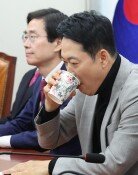[Opinion] Eliminate Time Limit for Prosecuting `State Crime`
[Opinion] Eliminate Time Limit for Prosecuting `State Crime`
Posted January. 10, 2002 09:26,
The truth about the deliberate coordinated effort to cover-up the murders of Professor Choi Jong-Gil and Suzie Kim by government offices. Alternating between shock and anger, we confront the challenge of finding a way to deal with human rights criminals who use the power of the nation to violate human rights.
The reason why one murder in Hong Kong in 1987 should be covered up as an anti-state crime case has to do with the faulty intelligence gathering and unethical conduct of then leaders in the KCIA and the Ministry of Foreign Affairs. Although the press reports on this case last year raised questions about it and led to a police investigation, the National Intelligence Service (NIS) executives and deputy chief of the National Police Agency (NPA) colluded to stop the investigation.
The Suzie Kim case, which lay covered under a massive state protection, went through several twists and turns, and only now, after 15 years, are we closing in on the truth. Kim Seung-Il, former NIS executive, and Lee Moo-Young, former deputy chief of the NPA, face prosecution for this.
However, Chang Sae-Dong, former director of the KCIA, who was the central figure in covering up the Suzie Kim murder case, has escaped justice because the seven-year time limit for prosecution has long passed. This must certainly be mortifying to the family members who had to live with the stigma of harboring a spy for 15 hard years. The family members have decided, therefore, to start a petition campaign in order to bring Chang Sae-Dong to justice. There are crimes that cannot go unpunished, no matter how long of a time has passed, and a case like this where major governmental bodies were involved is one such crime.
NMDP`s Ham Seung-Hee is preparing to launch a petition drive in order to introduce a bill to eliminate the prosecution time limit so that willful crimes against humanity and society may not go unpunished.
Although administrations change, the crimes of the past remain. Law and order will stand anew only when these crimes of the past are justly addressed. Accordingly, the task of uncovering the truth about past political crimes is important for guaranteeing human rights, justice, and the future of our collective life.
The problem is that time passes by swiftly while the search for the truth takes time. As more time passes, the crimes of the past go deeper underground and collective life goes on above. It is not an easy thing to dismantle the building standing on the ground in order to get to the truth hidden beneath it. Hence, lawmakers made a provision for a time limit on criminal prosecution in the interest of legal stability, and as a result crimes which happened over fifteen years ago cannot be indicted. It is an unfortunate thing, but it is customary for the criminals to benefit from this law in normal times.
The issue, however, is whether the protective shield of a time limit is legitimate in face of an extreme case where the state abused its power and committed a crime and whose injustice enrages us. Is it right to protect the confidentiality of criminals, who violated human rights by wielding political power, when the contradiction between legal stability and justice is so extreme?
When the past crimes of the Nazis were on trial in Germany, the legal scholar Gustaf Radbruch returning from exile stated, "In the case where the law of an unjust government violates justice to an intolerable degree, the unjust content of the law must be supplanted by justice." This formula gained new currency in 1990 during the German unification when hearings on past crimes committed by the state were taking place. A human rights crime that brings about greater injustice due to the time limit may annul the time limit, but it is possible to eliminate the time limit altogether or supplement it with exceptions. In French case law, the principle holds that `time limits do not apply to persons who cannot be validly prosecuted`.
We cannot hope for collective happiness and prosperity when distorted facts lie buried and people suffer unjustly. We must incline our ears to the voice of those who died unjustly in order to confront the horrible human rights violations that the state committed.
Kim Il-Soo (Koryo University, Professor of Law)







